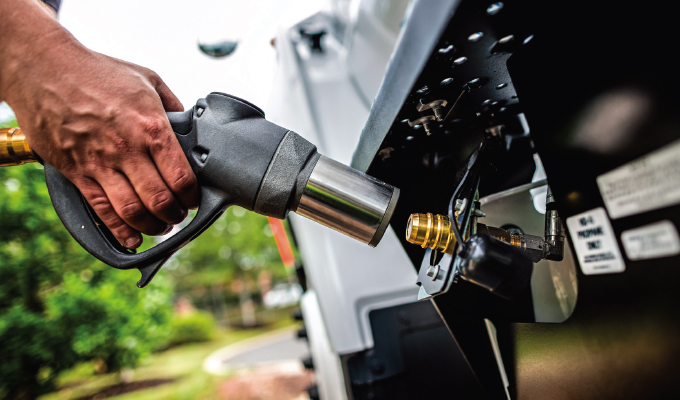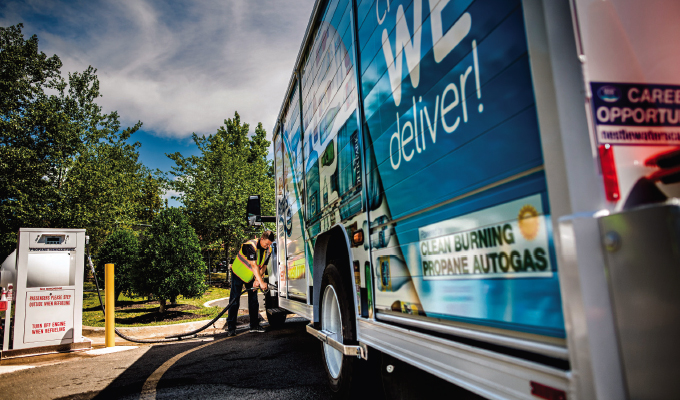In the last decade, the discussion around alternative energy has ballooned into a national conversation that’s had nearly every fleet owner asking, “Should I transition to an alternative fuel?” or “Which alternative fuel is right for me?” With several energy source options available to medium-duty truck owners, it can feel like a monumental task to do the research for each option to discover what makes the most sense for their fleet. While an environmental benefit is the ultimate goal, fleets shouldn’t have to compromise in other areas to make it a reality.
One place for fleet owners to start their research is by asking themselves about the benefits of the alternative energy source in three main categories: the environment, finances, and operation. If an alternative energy source can provide advantages in each of those areas, it’s worth digging deeper to find out more. Here’s more criteria to assist fleet owners with how to answer each question.
THE ENVIRONMENT
It may seem a little obvious that fleets will likely see an improvement in emissions reductions if they’re currently operating a diesel or gasoline fleet, but owners should dig a little deeper to see what those benefits really are and if the environmental benefit might cause them to compromise elsewhere. Fleet owners should ask if the energy source will provide a reduction in emissions over the life cycle of the vehicle without increasing cost or losing efficiency.
For instance, propane autogas is an ultra-low emissions energy source with near-zero particulate matter emissions and nitrogen oxide (NOx) emissions that are 90% lower than the Environmental Protection Agency (EPA) standards.
Plus, in a recent comparative analysis researchers found propane-powered medium-duty vehicles provide a lower lifetime carbon footprint in most states when compared to medium-duty EVs that are charged using the electric grid in those states. This is due to the amount of carbon that is produced from each state’s energy mix for electricity generation using coal, petroleum, or other energy sources, and due to powertrain production (chiefly battery manufacturing). When comparing the difference in life-cycle equivalent carbon dioxide (CO2eq) emissions of a single medium-duty vehicle, propane autogas on a national average emits 125 tons of CO2eq less than an electric medium-duty vehicle.

THE FINANCES
At the end of the day, a fleet can’t be environmentally sustainable if it can’t be financially sustainable. When it comes to finances, fleet owners need to ask themselves if the energy source provides a total cost-of-ownership reduction or a return on investment long before the end of the vehicle life cycle.
For fleets that operate with propane autogas, this question is easy to answer. When you factor in the cost of a new vehicle regardless of fuel type and the costs for fuel, fluids, maintenance, and repairs, propane autogas has the lowest cost of any fuel for the lifetime of the vehicle.
One of the reasons for that is because the average fuel costs for propane autogas are up to 50% lower than diesel. Not to mention, because propane autogas is a clean energy source, the engine is less costly to maintain than a diesel engine because it doesn’t require expensive exhaust after-treatment systems diesel engines need to meet emission standards.
As for the vehicle itself, the incremental capital cost for a medium-duty propane autogas vehicle, relative to its gasoline or diesel counterpart, is on average 15%. Comparatively, a similar medium-duty EV is over 250%. Not to mention, the cost to purchase and install refueling equipment for a fleet of medium-duty propane autogas vehicles is a fraction of the cost to purchase fast charger equipment for charging a comparable electric vehicle fleet in a comparable time frame.
THE OPERATION
Finally, fleet owners need to think about the operation of their vehicles. The question to ask here is does the vehicle perform as well or better than the original energy source without compromising on range?
Continuing with the example of propane autogas, there are many medium-duty work truck fleets currently running on propane because they need a range of 100 to 400 miles per day and the ability to carry a heavier payload. Not every energy source can meet those needs. For instance, electric vehicles need to recharge long before a propane autogas vehicle would need to refuel.
As for performance, propane autogas engine technology has evolved in the last decade to bring fleet owners performance comparable to gasoline or diesel. In fact, the new Cummins B6.7 Propane is a 6.7-L displacement engine that will provide fleet owners with better-than-diesel performance with a projected power rating of up to 360 hp and 860 lb-ft of torque.
THE RIGHT QUESTIONS
Transitioning to an alternative fuel doesn’t have to be a scary decision. By asking the right questions up front to help guide their research, fleet owners will be able to make an informed decision on how to meet their environmental, financial, and operational goals.
ABOUT THE AUTHOR
Steve Whaley is the director of autogas business development for the Propane Education & Research Council. Reach him at stephen.whaley@propane.com. For fleets interested in learning more about propane autogas, visit www.propane.com/fleet-vehicles.




